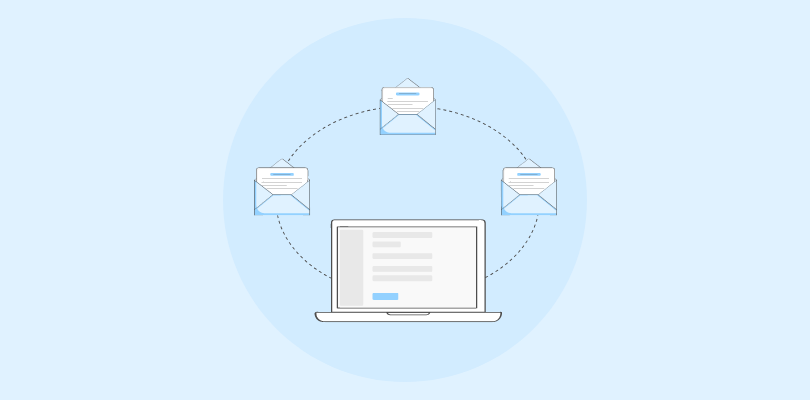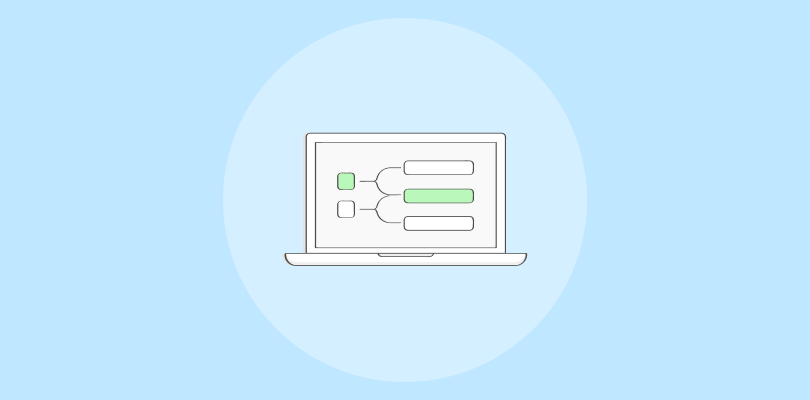There’s no denying it — running an e-commerce business is far from being easy.
If you have a Shopify store, I understand how challenging it can be to keep track of everything that goes on in your business. From endless customer inquiries and tracking sales to managing inventories, the list goes on.
Amidst all this, if your customer relationships are taking a hit, it might be time to invest in a dedicated CRM solution for your ecommerce store!
| Software | Best For | Pricing |
|---|---|---|
| BIGContacts | Contact management & email marketing tool for small businesses & startups | Forever free plan for startups with all premium features. Paid starts at $9.99/user/month with a 15-day free trial. |
| Metrilo | ecommerce analytics | Starts at $119/month. |
| Freshmarketer | Multichannel engagement for SMBs | Free for limited contacts. Paid plans start at $19/user/month. |
| Zendesk Sell | Sales Teams | Starts from $19/user/month. |
| HubSpot CRM | Campaign Management | Free plan available with limited features. Paid plans start at $18/month. |
| Salesforce | Personalized Buying Experiences | Starts from $25/user/month. |
| ActiveCampaign | Customer Experience Automation | Starts from $19/user/month. |
These are not just ordinary relationship management tools; they are powerful solutions that can boost your productivity, efficiency, and profitability by handling the complexity so you can focus on what you love most- selling!
7 Best CRM for Shopify Integration
“The well-satisfied customer will bring the repeat sale that counts.”
~ James Cash Penney
But what does it take to keep your e-commerce customers well-satisfied?
The answer lies in bringing the capabilities of your e-commerce platform and CRM together.
I have worked with a number of tools over the years and found these 7 tools to be the best for businesses using Shopify. This list is also supported by recommendations from peers and online reviews.
1. BIGContacts – Best for contact management & email marketing for small & medium businesses
If simplicity is what you are after, BIGContacts deserves your undivided attention.
When it comes to the needs of small businesses and startups, the ecommerce tool shines out with its clean interface, straightforward implementation, and unparalleled customer support available 24×7 via chat, call, and email.
My experience with this simple and affordable platform has been nothing short of delightful.
I can easily access all client details, such as purchase history, buying preferences, transactions, emails, and notes, from a centralized dashboard in BIGContacts, making it significantly easier to drive more personalized communication.
With the powerful pipeline tracking, contact data management and lead management capabilities of this software, I am able to nurture more leads into long-term customer relationships.
On top of that, the automation capabilities of this CRM for Shopify are quite impressive. I can easily create drip email campaigns to reach clients at the most appropriate time in their buying journey.
What You’ll Like:
- Seamless import and two-way synchronization of data
- 360° view of customer details, transactions, activity history, etc.
- Automated tasks, workflows, and reminders contribute to improved efficiency
- Visual sales pipeline with custom stages and a drag-and-drop interface for lead management
- In-depth reports help track business performance
What You May Not Like:
- The 15-day free trial is not enough to explore its vast range of features
- Better deduplication features are required
Pricing:
- Forever free plan for startups with 100 contacts.
- Paid starts at $9.99/month with a 15-day free trial.
2. Metrilo – Best for E-Commerce Analytics
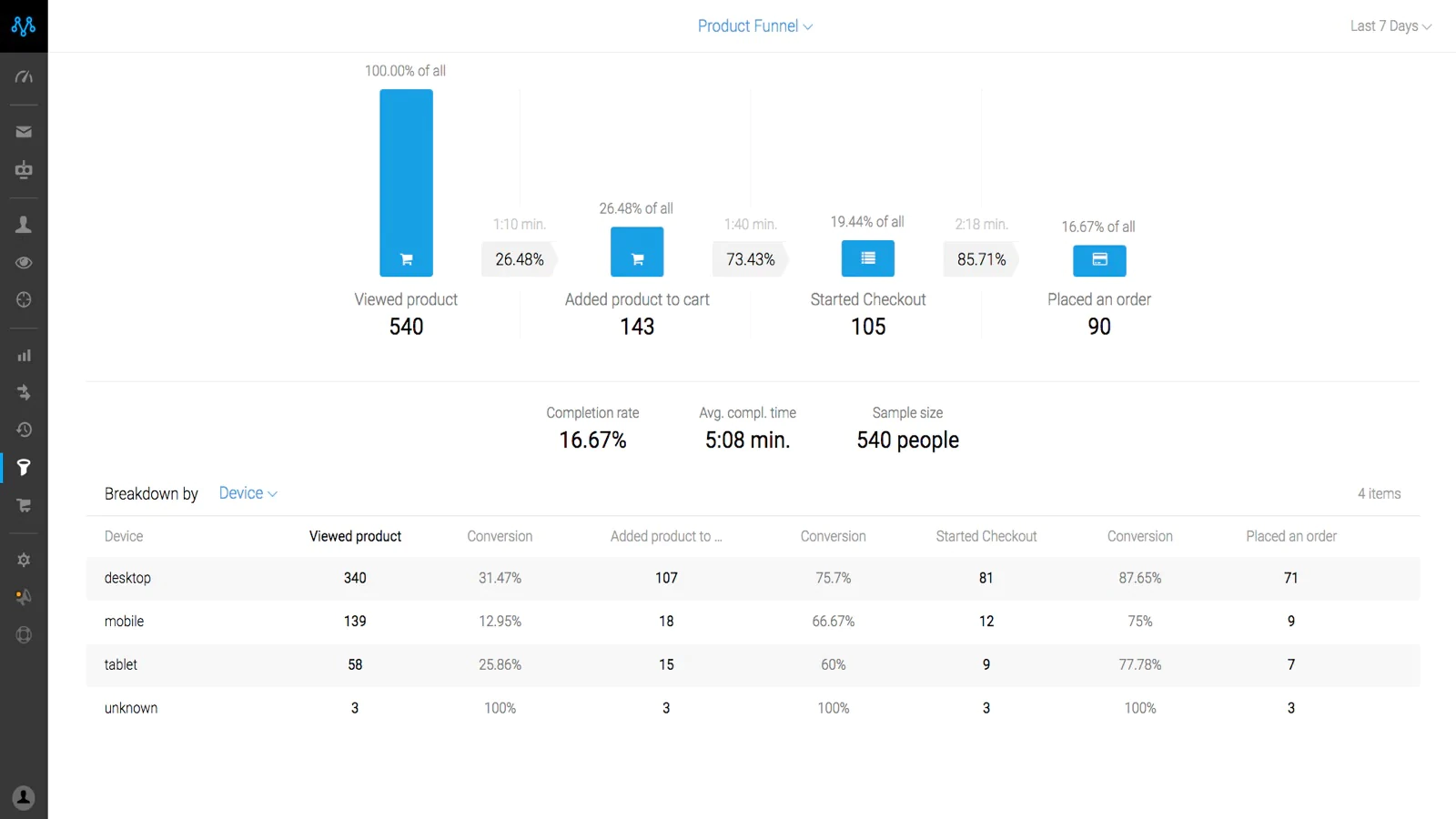
Image Source: Shopify
I used Metrilo upon recommendation from another Shopify store owner, and the outcomes were pretty satisfactory.
Serving as an efficient e-commerce CRM, Metrilo captures and organizes customer data into a single place, providing access to customer profiles complete with their behavioral patterns, order history, interactions, and lifetime spend profiles.
The tool makes it possible to track different attributes of the customer journey on our website, including page views, checkouts, searches, and more. It also provides product performance stats as well as advanced customer retention analysis for improved decision-making.
Other than the exceptional analytics features, the tool’s email marketing capabilities also stood out to me. The templates and the drag-and-drop editor are absolute lifesavers.
What You’ll Like:
- One-click integration with Shopify that imports your data automatically
- Track website visitors’ behavior and sources to create detailed customer profiles
- Real-time analytics dashboards provide insights into improving business performance
- Easy filtering and segmentation based on various attributes for better targeting
What You May Not Like:
- The tool is expensive compared to other CRM options
- Many advanced features like retention analysis and email marketing are only available in the higher-priced plans
Pricing:
- Starts at $119/month.
3. Freshmarketer – Best for Multichannel Engagement for SMBs
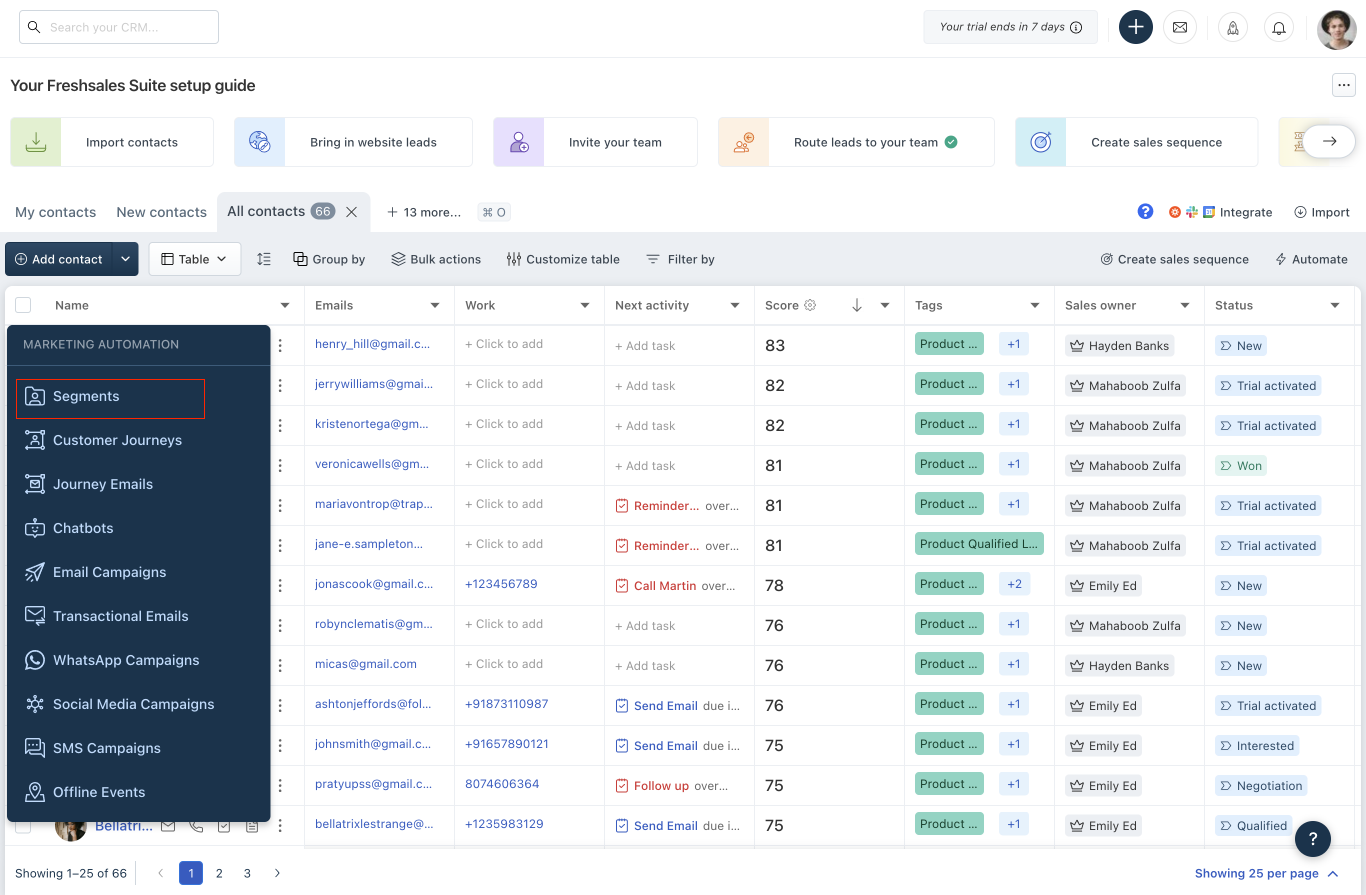
Source: Freshmarketer
For small and medium-sized businesses, Freshmarketer is one of the most promising CRM solutions.
With its seamless Shopify integration, it completely transformed how I managed and engaged with my customers. To begin with, the tool helped me deliver consistent communication to clients across multiple channels.
Other features of the tool that supported the growth of my e-commerce business include real-time email tracking, contact scoring, and detailed activity timelines.
Another feature that you’ll be impressed with is the ability to automate workflows that help you sell more. You can choose from a wide range of templates, whether it’s for e-commerce journeys, emails, or chatbots.
What You’ll Like:
- Multichannel client engagement across email, WhatsApp, SMS, live chat, and social media.
- Pre-built Shopify playbooks to help you launch effective campaigns easily
- Reports to monitor metrics such as abandoned carts, checkouts, etc.
- Customer segmentation based on their activity allows you to create targeted marketing strategies.
What You May Not Like:
- Users looking for more specialized templates may need to create their own or work with third-party applications
- For users who are new to CRM and marketing automation tools, Freshmarketer can be somewhat overwhelming
Pricing:
- Free for limited contacts. Paid plans start at $19/user/month.
4. Zendesk Sell – Integrates CRM with existing Zendesk support
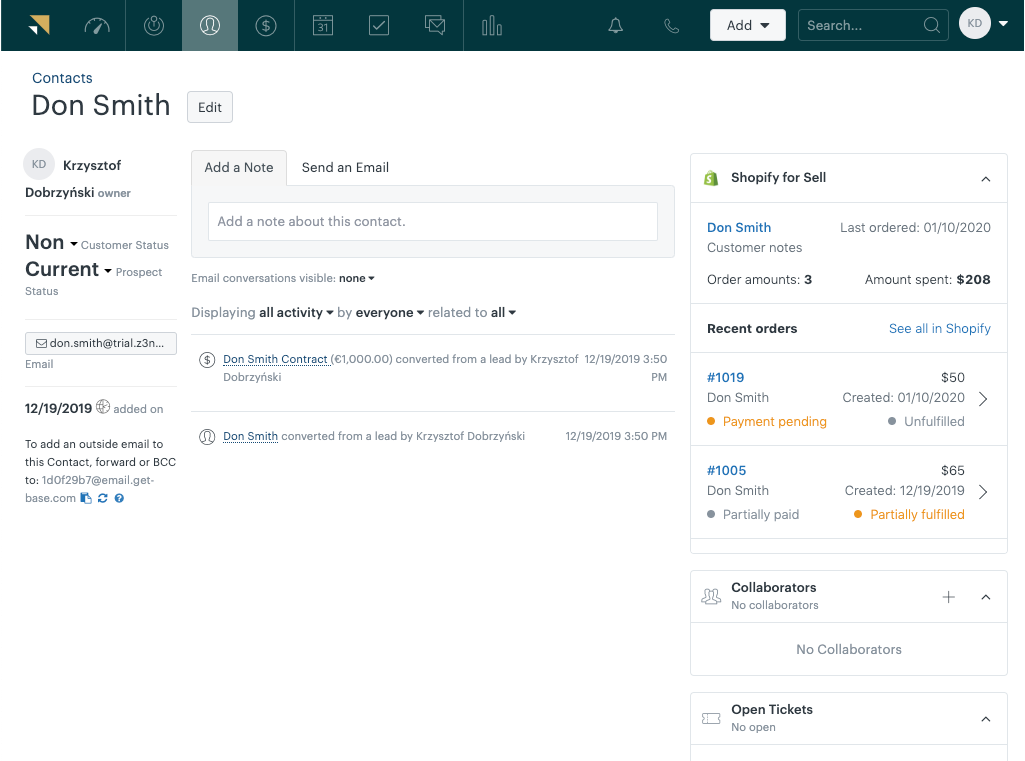
Image Source: apps.zdusercontent.com
Zendesk Sell’s integration with Shopify is one of its many offerings to enhance the productivity of sales teams.
Sales reps can easily view data from Shopify, including important customer details, billing information, and recent orders, while viewing contacts in the CRM system. This synchronization reduces context switching and enables sales professionals to engage more effectively.
Another feature that truly won me over was Zendesk Sell’s solid reporting and analytics feature. Packed with data-driven insights, it decisively equipped me to form and execute strategic decisions for the benefit of my online store.
Also, the tool captures data automatically, saving my team substantial time and helping build strong customer relationships.
What You’ll Like:
- Ready-to-use email templates help you save time and ensure consistent communication
- Centralized customer data makes it easier to drive contextual conversations
- Automated email and task sequences to engage with leads more effectively
- A mobile app to help you stay on top of deals at all times
What You May Not Like:
- Customer support is not up to the mark
- Zendesk Sell’s interface and functionality can be a bit complex and challenging to learn
Pricing:
- Starts from $19/user/month.
5. HubSpot CRM – Best for centralizing sales, marketing, and support operations
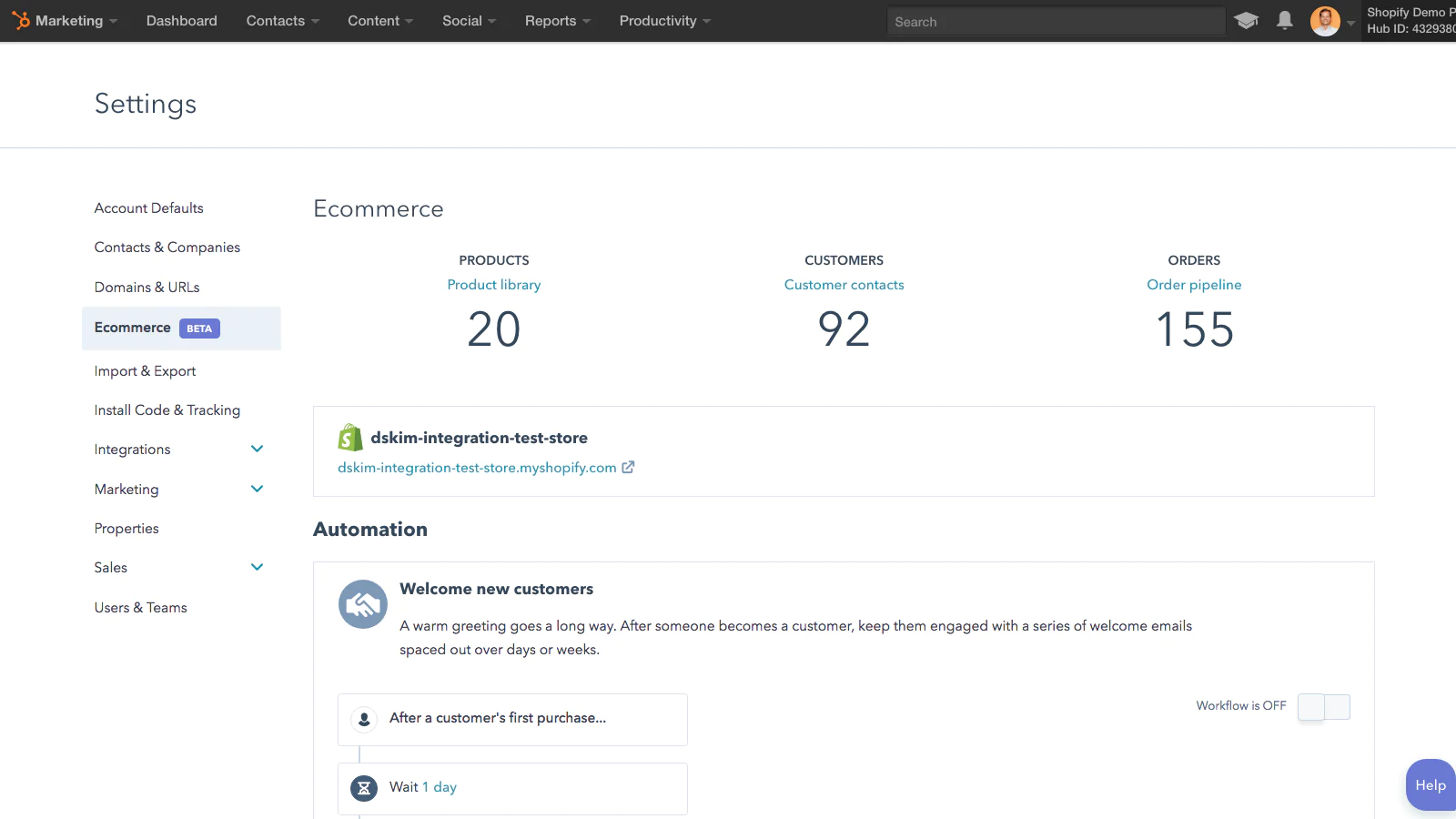
Image Source: cdn.shopify
If you are looking for a CRM tool that facilitates successful marketing campaigns using data from your Shopify account, HubSpot is definitely worth a try.
This is a powerhouse of features to boost the productivity of your online store.
I used the free version of this CRM application and found it to be a great way to acquire a singular view of my customers. All the important details can be accessed centrally, making it much easier to create customer segments and run personalized marketing campaigns.
The tool also enabled me to generate out-of-the-box reports that provided actionable insights into improving the performance of my online store.
What You’ll Like:
- Auto-sync Shopify customers, products, and deals with HubSpot
- Abandoned cart email nurturing and re-engagement campaigns to make more sales
- Detailed reports to achieve better visibility into your business operations
- Automatic enrichment of contact profiles from data collected from multiple sources
What You May Not Like:
- To fully utilize HubSpot, you might need to upgrade your plan and get add-ons, which could be costly
- It can be complex for new users or small businesses
Pricing:
- Free plan available with limited features. Paid plans start at $18/month.
6. Salesforce – Best for large and complex sales organizations
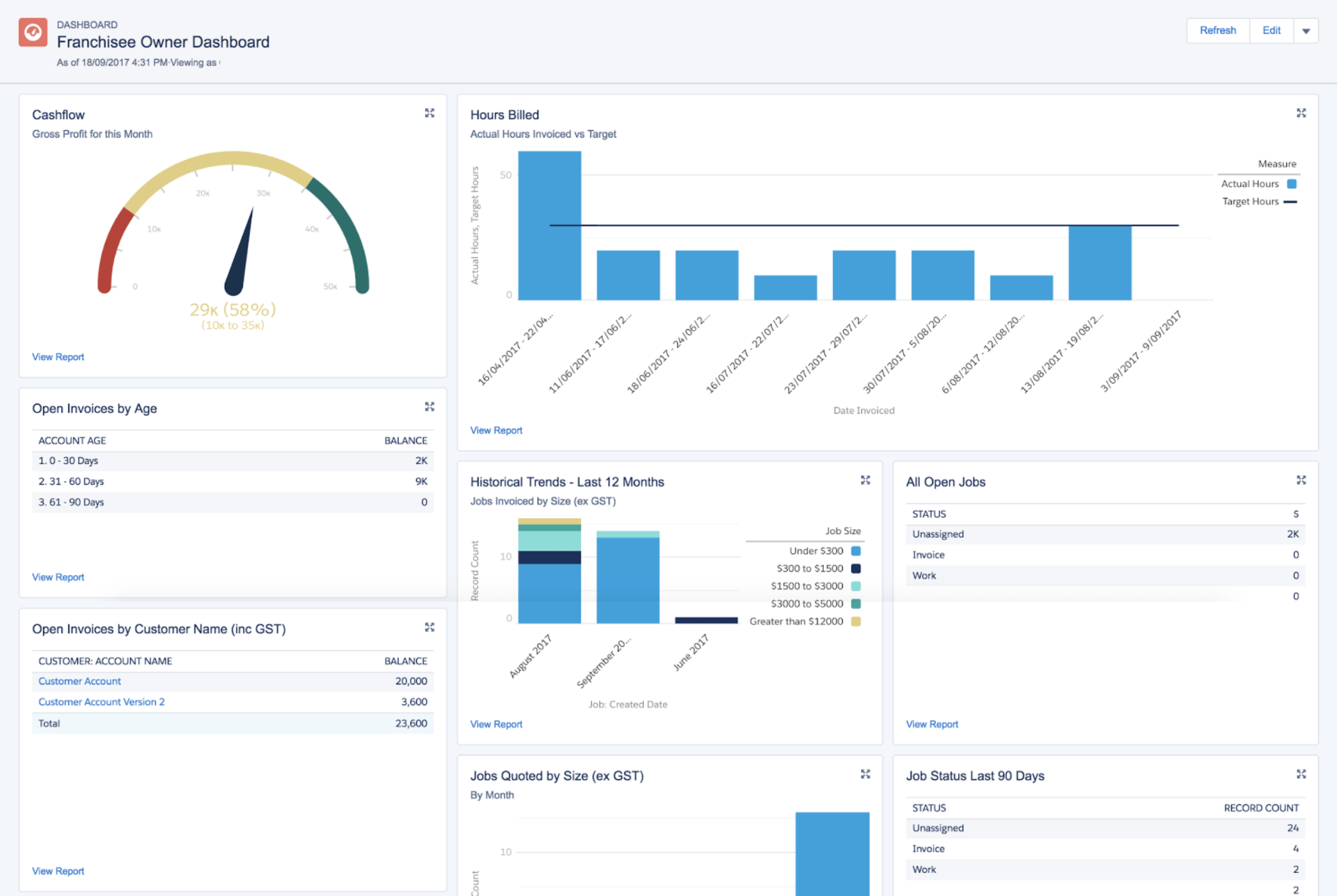
Source: Salesforce
Salesforce is an AI-powered tool that can be integrated with Shopify to deliver more personalized buying experiences.
I have heard resounding applause for the tool from many peers and consider it a top contender for Shopify CRM apps.
It excels at integrating customer data from all channels, providing comprehensive insights that enable personalization at scale.
You will also find that Salesforce’s automation capabilities are a blessing, freeing up time to focus on the more creative, strategic aspects of the business. What’s more amazing is the zero code integration with Shopify, which further enhances the user experience.
What You’ll Like:
- Real-time synchronization of data between Shopify & Salesforce
- Automation of repetitive admin tasks to save time and reduce costs
- The ability to sync multiple Shopify stores with your CRM
- Detailed customer profiles are created automatically with data sourced from numerous online sources
What You May Not Like:
- Salesforce is the most suitable for large organizations and is comparatively expensive
- There is a steep learning curve associated with the tool
Pricing:
- Starts from $25/user/month.
7. ActiveCampaign – CRM with built-in marketing automation
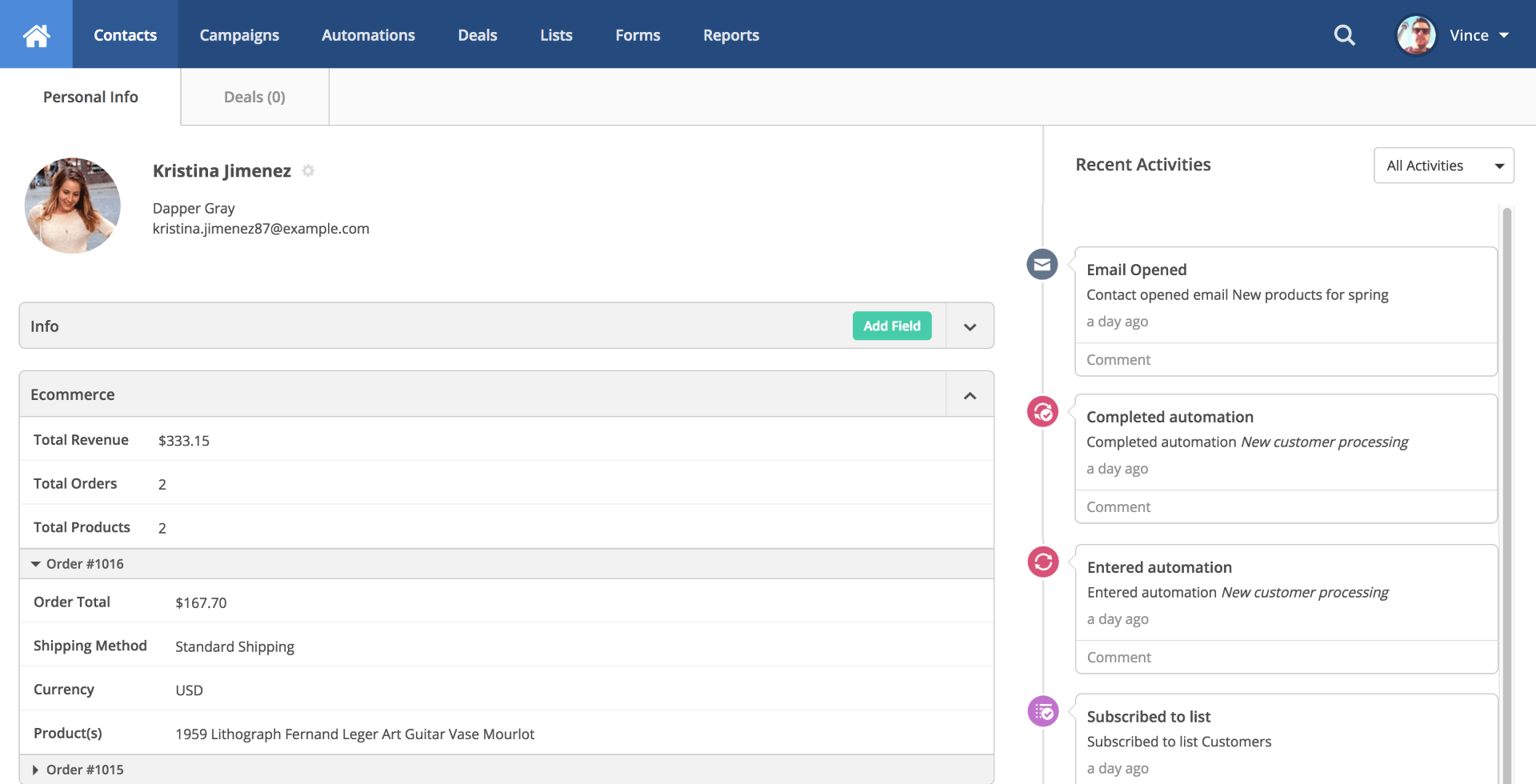
Image Source: Cloudfront
ActiveCampaign’s integration with Shopify works out exceptionally well for businesses looking to engage their online shoppers better.
I opted for the free trial of the tool and found its automation capabilities to be tremendously valuable.
The platform made it exceptionally easy to create personalized messages for my shoppers, such as discount offers, product recommendations, and review requests. I was able to use purchase behavior and abandoned cart data to send customized follow-up emails, create segments, and more.
Overall, I would highly recommend it for e-commerce businesses looking to scale their operations by leveraging automation.
What You’ll Like:
- Surfaces upselling and cross-selling opportunities to enhance your profitability
- Automated email sequences for abandoned carts
- Conditional content and promotional SMS improve customer engagement
- Customer segmentation to deliver more personalized experiences
What You May Not Like:
- If you’re new to CRM systems, you might have a bit of trouble navigating the platform at first
- Most of the advanced features are only available on higher-tiered plans
Pricing:
- Starts from $19/user/month.
How to Choose the Best Shopify CRM
Shopify is one of the most popular tools for taking your business online.
However, it cannot solely help you build and maintain relationships with your customers.
To create more delightful experiences for prospects and customers, you must invest in a CRM that collates their information, making it easily accessible for you.
Here are some practical tips I’ve found useful in the selection process-
Identify Your Needs:
Understand the unique needs of your business – More email capabilities? Better automation? Detailed analytics? Your priorities will guide your choice.
Read More: How to Choose a CRM in 24 Ways (Step-by-Step Checklist + Free Guide)
Integration:
It’s vital to confirm how well the CRM integrates with Shopify. Seamless data syncing across both platforms is crucial.
Usability:
Look for a user-friendly CRM. It should enable you and your team to realize its full potential without dedicating excessive time to learning its intricacies.
Automation:
Efficient automation, like sending targeted emails based on customer behavior, can vastly improve your marketing. Those offering automation should be high on your list.
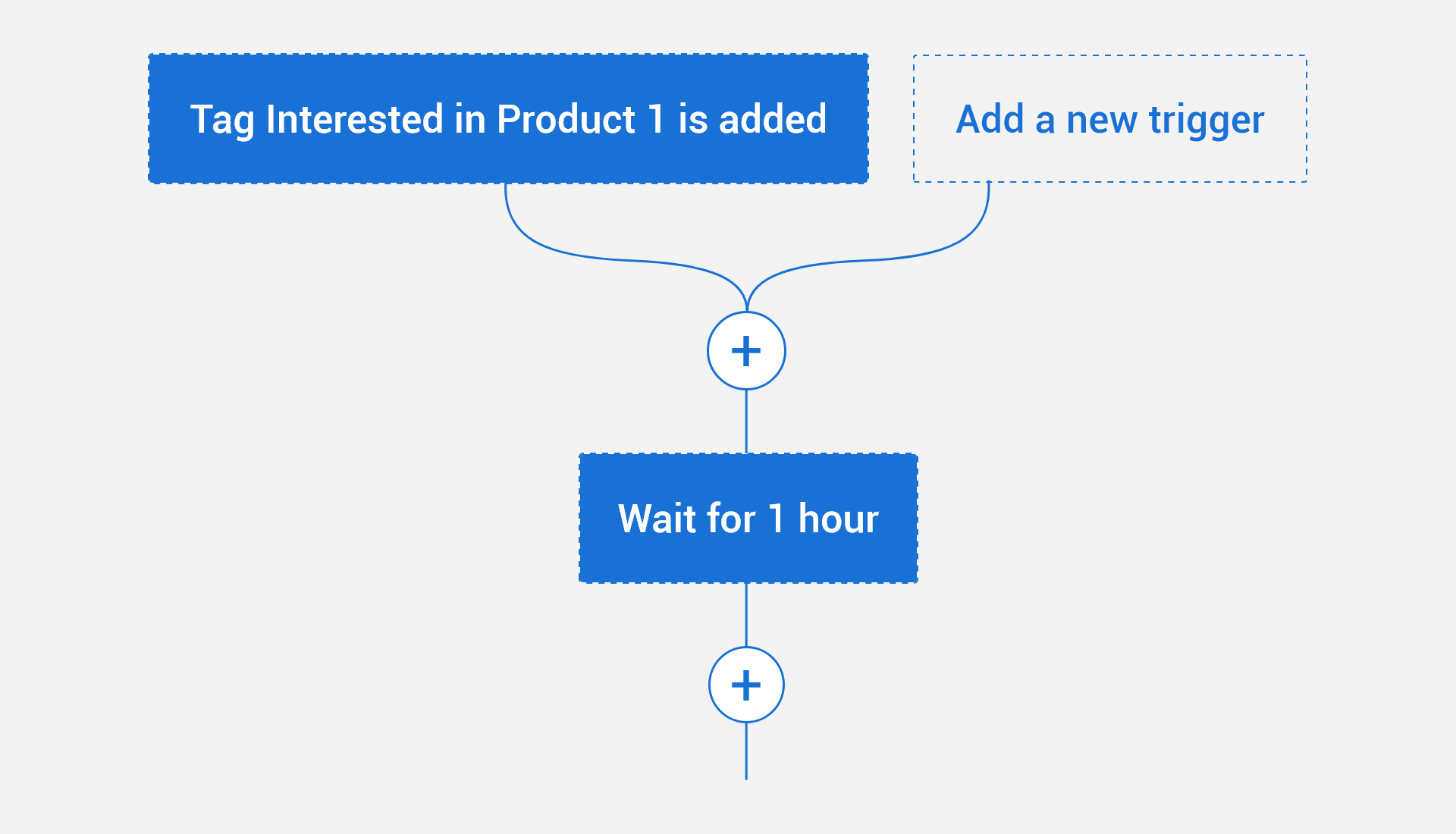
Cost-Effectiveness:
The cost should align with your budget and what the platform offers. Don’t compromise crucial features for cost, but also, don’t overpay for features you won’t use.
Read More: How Much Does CRM Cost? | Prices of Leading CRMs
Free Trial:
A sure-shot way to test the usability of the tool and assess its integration with Shopify in your context is to opt for a free trial.
Customer Support:
Finally, reliable customer service assists you in capitalizing on the CRM’s features and resolving any issues swiftly.
This quick video helped me find the most optimal CRM based on the unique needs of my small business.
Which is the Best CRM to Use with Shopify?
Whether you’re a seasoned e-commerce pro or just starting your online retail adventure, having the right CRM can make all the difference in how you engage with customers, boost sales, and ultimately grow your business.
This is a roundup of my three best picks from the list above-
Option 1: BIGContacts
BIGContacts is a superb choice for SMBs and startups. It has an easy-to-use interface and advanced contact management features. Plus, it’s extremely affordable contact management software. The platform integrates with Shopify effortlessly, allowing for smooth data synchronization and efficient marketing automation.
Option 2: Zendesk Sell
Best suited for sales teams, Zendesk Sell is another great choice. With robust sales tracking and analytics, it ensures you never lose sight of your sales and customer interactions.
Option 3: Salesforce
Salesforce is ideal for large-scale enterprises. Its comprehensive features, including sales forecasting and robust analytics, work smoothly with Shopify, handling massive data efficiently.
Regardless of your choice, a quality CRM implemented correctly will undoubtedly enhance your customer experience and business performance. So, make an informed decision today and find the perfect fit for your Shopify store.
Evaluation Criteria
The evaluation of products or tools chosen for this article follows an unbiased, systematic approach that ensures a fair, insightful, and well-rounded review. This method employs six key factors:
- User Reviews / Ratings: Direct experiences from users, including ratings and feedback from reputable sites, provide a ground-level perspective. This feedback is critical in understanding overall satisfaction and potential problems.
- Essential Features & Functionality: The value of a product is ascertained by its core features and overall functionality. Through an in-depth exploration of these aspects, the practical usefulness and effectiveness of the tools are carefully evaluated.
- Ease of Use: The user-friendliness of a product or service is assessed, focusing on the design, interface, and navigation. This ensures a positive experience for users of all levels of expertise.
- Customer Support: The quality of customer support is examined, taking into account its efficiency and how well it supports users in different phases – setting up, addressing concerns, and resolving operational issues.
- Value for Money: Value for money is evaluated by comparing the quality, performance, and features. The goal is to help the reader understand whether they would be getting their money’s worth.
- Personal Experience / Experts’ Opinions: This part of the evaluation criteria draws insightful observations from the personal experience of the writer and the opinions of industry experts.
Learn More About Shopify CRM Integration
What is CRM?
Customer relationship management software improves customer interactions, helping build long-lasting relationships. By keeping all data, emails, notes, and files stored centrally, CRM can help your team work more efficiently. Essentially, it automates repetitive tasks, contributing to better utilization of time and resources.
Does Shopify support CRM?
Shopify, as an e-commerce platform, doesn’t offer a built-in CRM system. However, you can integrate third-party CRM solutions like BIGContacts with your Shopify store to manage customer data, track interactions, and improve customer engagement.
What are the benefits of CRM integration with Shopify?
Integrating a CRM system like BIGContacts with Shopify offers several advantages:
- CRM integration allows you to consolidate customer information from multiple sources, including your website, email, and social media, into one database.
- CRM systems enable you to segment your customer base and create targeted marketing campaigns to increase sales.
- You can provide better customer support by having access to a customer’s purchase history and previous interactions.
- CRM tools can help your sales team track leads, manage deals, and automate follow-up tasks.
What features can CRM add to Shopify?
Integrating CRM with Shopify can add several features, including:
- Customer Profiles: Detailed customer profiles with purchase history, contact information, and communication history.
- Lead Management: Tracking and nurturing leads through the sales funnel.
- Automated Emails: Sending personalized emails and notifications to customers based on their behavior.
- Analytics: Analyzing sales data and customer behavior to make data-driven decisions.
- Task Automation: Automating repetitive tasks like data entry and follow-up emails.
How do I integrate Shopify with CRM?
Shopify can be integrated with a CRM through the use of APIs or dedicated integration apps available. The integration process varies, but it usually involves logging into your CRM, finding Shopify among the integrations, and following the instructions. Many CRM providers offer step-by-step guides or customer support to assist with the integration process.
Are there any data security concerns associated with Shopify CRM integration?
Data security is a crucial aspect of CRM integration. When choosing a CRM system, ensure it complies with industry-standard regulations like GDPR and data encryption practices. Additionally, Shopify and CRM providers often have security measures in place to protect customer data during integration, such as secure API connections and data encryption during transfer and storage.
FREE. All Features. FOREVER!
Try our Forever FREE account with all premium features!




